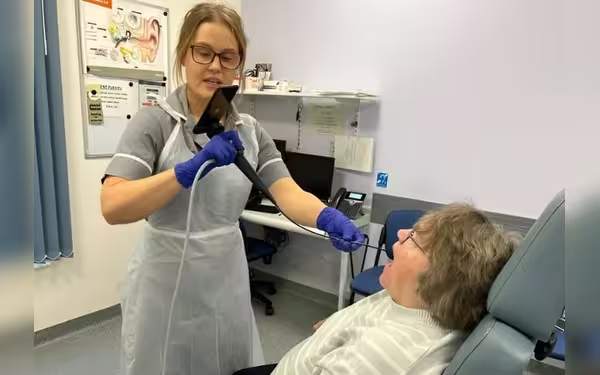Thursday, November 7, 2024 03:35 AM
NHS Innovates Throat Cancer Diagnosis Using iPhone Technology
- NHS tests iPhone technology for throat cancer diagnosis.
- Rapid diagnosis could save lives of patients.
- Smartphone-connected camera enhances accessibility and efficiency.
 Image Credits: tribune.com.pk
Image Credits: tribune.com.pkNHS tests iPhone technology for faster throat cancer diagnosis, promising rapid results and improved patient care.
Throat cancer is a serious health concern that affects thousands of people every year. Early diagnosis is crucial for effective treatment, yet many patients often face long waiting times for consultations. In the UK, the National Health Service (NHS) is taking a significant step forward by testing a new medical technology that utilizes the iPhone to help diagnose throat cancer more quickly and efficiently.
Traditionally, patients have had to wait weeks to see a specialist, which can be incredibly stressful and detrimental to their health. However, the NHS is hopeful that this innovative smartphone-connected camera device will change the game. By capturing images of the throat instantly, specialists can examine these images and deliver results within hours, rather than weeks. This rapid response could mean the difference between life and death for many patients.
The technology works by connecting a camera to the iPhone, allowing doctors to take high-quality images of the throat. These images can then be analyzed using advanced software, which helps in identifying any abnormalities that may indicate the presence of cancer. This method not only speeds up the diagnosis process but also makes it more accessible for patients who may have difficulty traveling to medical facilities.
Moreover, the use of smartphones in healthcare is becoming increasingly popular. With the majority of people owning smartphones, this technology could potentially reach a wider audience, making it easier for patients to get the care they need. It is a prime example of how technology can be harnessed to improve health outcomes.
The NHS's initiative to use iPhone technology for faster throat cancer diagnosis is a promising development in the field of healthcare. It highlights the importance of innovation in medicine and the potential for technology to enhance patient care. As this technology continues to be tested and refined, it may pave the way for similar advancements in other areas of healthcare, ultimately leading to better outcomes for patients everywhere. The future of medical diagnosis looks bright, and it is exciting to think about the possibilities that lie ahead.













